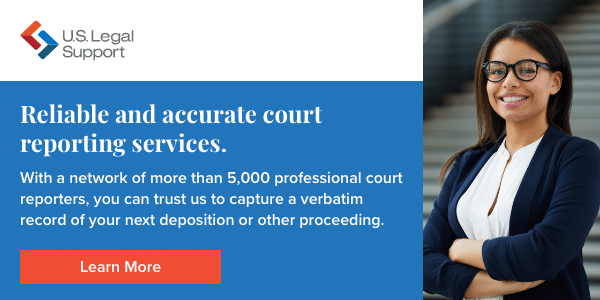How to Become a Court Reporter in California

Court reporters hold the great responsibility in civil and criminal justice of capturing testimonies and legal proceedings at the local level all the way up to the United States Supreme Court. While the importance and atmosphere might seem intimidating, court reporting is a desirable career opportunity, with easily accessible education, competitive salary, and flexible work schedules.
In fact, the U.S. Bureau of Labor Statistics (BLS) reports the job outlook to increase by around 3% over the next year, keeping court reporting professionals in high demand.
With that in mind—let’s explore the steps to becoming a court reporter.
Steps to Becoming a Court Reporter in California
Court reporting doesn’t require decades of academic education or years of apprenticeship, but it is a profession that requires various education and licensing in each state—which means your first step is to investigate your state board’s requirements.
Note: In this article, we cover the basics but focus particularly on how to become a court reporter in California.
Education
There are multiple routes to becoming a court reporter, but they all start with a minimum education of a high school diploma or GED.
Further education is available via court reporting programs at community colleges and technical institutes, typically leading to a two-year associate’s degree or certificate. These programs help students work toward obtaining fast typing speeds and accuracy, as well as covering:
- Technology such as stenotype machines, steno masks, or digital reporting equipment1
- Transcript procedures
- English grammar, punctuation, and spelling
- Legal terminology and studies
- Research
In California, there are only eight stenography schools with programs recognized by the licensing board.2 You can also opt to pursue one of three specific professional certification tracks, or simply obtain provable on-the-job experience rather than attending a degree or certificate program.
Most states allow you to skip a degree program in favor of direct job experience or certification from a recognized professional association. Check with your state board to see what education, certificates, or experience is required for licensure.
Skills Required
If you’re considering a career as an official court reporter, you’ll need to bring more to the table than a high WPM (words per minute) count. Top-notch court reporters have:
- A keen eye for detail and a perfectionist’s attention to accuracy
- Calm, patience, and a long attention span
- The assertiveness to interrupt a trial or meeting for clarification when needed
- Familiarity and interest in legal procedures
- The ability to maintain impartiality and understanding of its necessity in a fair court system
- Advanced language skills and a love for the written word
At a technical level, court reporters need:
- Proven speed, accuracy, and understanding of machine shorthand entry
- Interest in the technology of devices, software, and their ongoing development
- The capability to manually translate shorthand to written transcripts
Certification
There are four primary organizations that offer accreditation to confirm professional court reporting expertise, based on the type of court reporting. You can learn directly from each how to become a certified court reporter under their programs:
- National Court Reporters Association (NCRA)
- National Verbatim Reporters Association (NVRA)
- American Association of Electronic Reporters and Transcribers (AAERT)
- United States Court Reporters Association (USCRA)
Licensure
Court reporters are licensed at a state level. While requirements vary from state to state, they typically include:
- Minimum age of 18
- A high school diploma or GED
- No (or very limited) criminal background
To prove professional skills and knowledge, licensing boards often require satisfactory completion of an exam, professional certification, or both.
In the Golden State, the Court Reporters Board of California is the gatekeeper for licensing Certified Shorthand Reporters (CSRs).7 In addition to the age, basic education, and criminal background check noted above, applicants must qualify to take an exam by providing one of the following8:
- 12 months of work experience as a verbatim court stenographer with at least 1400 hours capturing multi-voice judicial or related proceedings plus additional time transcribing records
- Completion of a prescribed course of study from a recognized court reporting school in California
- One of these certifications from either the National Court Reporters Association (NCRA) or the National Verbatim Reporters Association (NVRA):
- NCRA Registered Professional Reporter (RPR)
- NCRA Registered Merit Reporter (RMR)
- NVRA Certified Verbatim Reporter (CVR)
Once qualified, licensure applicants will take a three-part exam consisting of:
- Dictation and Transcription (200 words per minute with 97.5% accuracy to pass)
- English written examination
- Professional Practice written examination
Finally, after successful exam completion, a potential CSR submits an application and fee to the California Court Reporters Board to receive their license to practice.
Equipment & Technology
Court reporters typically specialize in one of three methods to capture verbatim testimony, each with their own unique equipment.
- Stenotype machine for stenography or machine shorthand
- Stenomask for voice writing
- Specialized software and high-performance audio recording for digital reporting
Benefits of Being a Court Reporter
While your day-to-day work life may not be quite as dramatic as a Law & Order episode, court reporting does provide variety, interest, and meaningful participation in civil and criminal cases that affect lives and legal precedent.
Additionally, you’ll benefit from a profession in court reporting through:
- Salary rate – California is a high-paying state for court reporters: the average annual salary is $102,406 (compared to the national average of $76,080). The top 10% of court reporter salaries in California average $153,000.9
- Salary growth – From 2018 to 2023, official court reporter salaries increased by 19%.9
- Flexible work schedule – Court reporters can opt to work full- or part-time and set their own hours if they opt for freelance work through agencies instead of employee status.
- Work from home – While virtual communication hit its peak during the pandemic lockdowns, the legal profession has continued to adapt to integrating more distance interactions. Depositions and other proceedings can take place at law offices, courthouses, on-site with far-flung witnesses, or online through virtual meeting platforms.
Now What?
If you’re ready to commit to a court reporting career, U.S. Legal Support can help. We offer:
- A mentorship program that helps you hone your skills, build industry knowledge, and develop strategies to navigate the profession
- Internships that provide job shadowing, one-on-one job review, and software training
Ready to learn more? Find out about these legal support services and ask general questions about court reporting careers by emailing reporterrelations@uslegalsupport.com.
Sources:
- CourtReporterEDU.org from Wiley University Services. Court Reporter Careers. https://www.courtreporteredu.org/
- Court Reporters Board of California. Recognized Court Reporting Schools. https://www.courtreportersboard.ca.gov/applicants/school_info.shtml
- National Court Reporters Association (NCRA).3 NCRA Certifications. https://www.ncra.org/certification/NCRA-Certifications
- National Verbatim Reporters Association (NVRA).4 NVRA Certifications. https://nvra.org/page/Certifications
- American Association of Electronic Reporters and Transcribers (AAERT).5 Certification Program. https://aaert.org/become-certified/certification-program/
- United States Court Reporters Association (USCRA).6 FCCR Certification. http://www.uscra.org/fcrr-certification/
- Court Reporters Board of California. Examination Information. https://www.courtreportersboard.ca.gov/applicants/information.shtml
- Court Reporters Board of California. Eligibility for Examination. https://www.courtreportersboard.ca.gov/applicants/eligibility.shtml
- Zippia. Court Reporter Salary. https://www.zippia.com/court-reporter-jobs/salary/

Editoral Policy
Content published on the U.S. Legal Support blog is reviewed by professionals in the legal and litigation support services field to help ensure accurate information. The information provided in this blog is for informational purposes only and should not be construed as legal advice for attorneys or clients.


